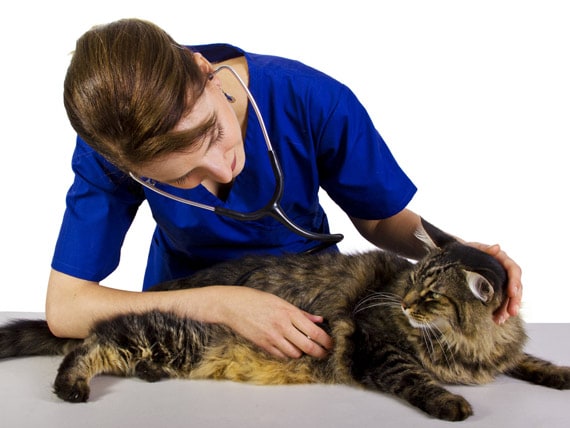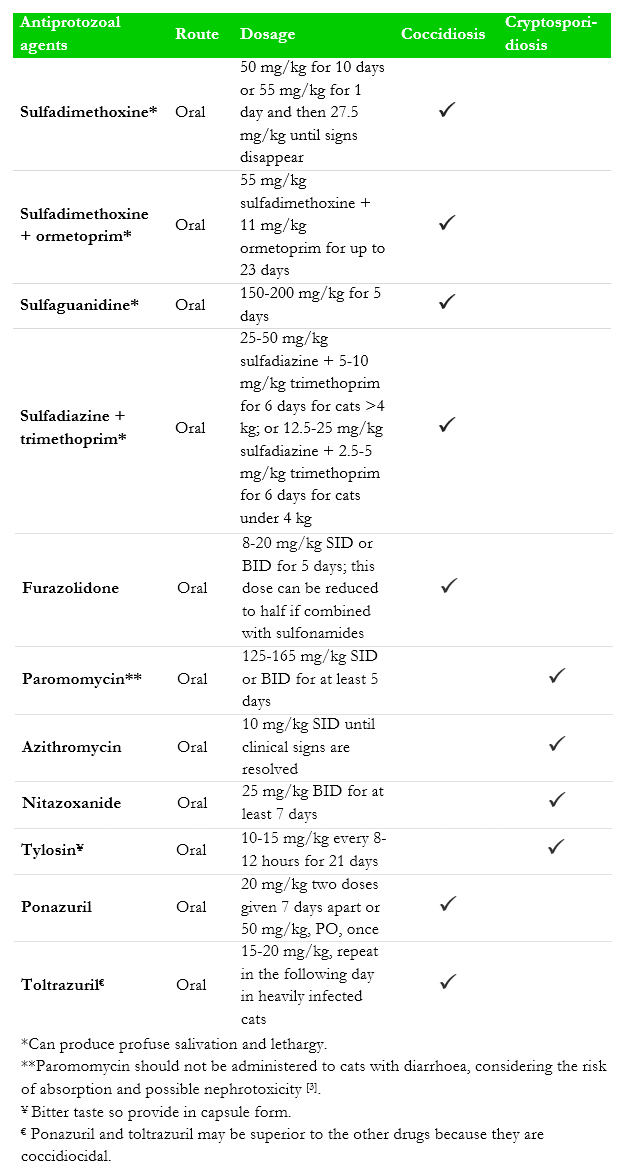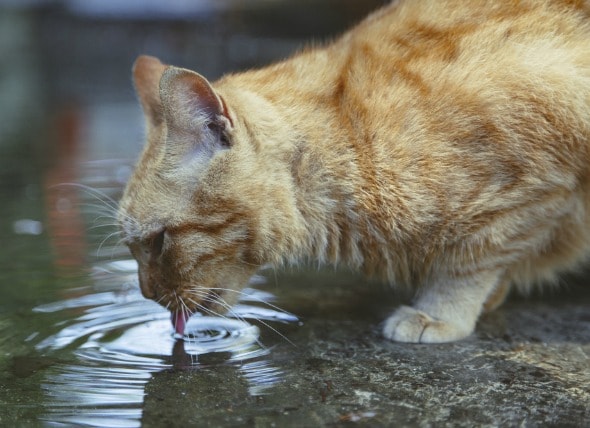crypto treatment in cats
This disease is no more likely to affect one breed than another and is commonly seen in kittens. Treatment involves prolonged oral antifungal therapy which can last many months as well as surgical excision of any skin lesions.
400 mL for cats 500 mL for dogs 20 kg 23 times per wk.

. There are several species that infect animals and may infect people. Cryptosporidium infection is of particular concern in humans that are immuno-compromised. Affected cats ranged from 2 to 15 years-of-age.
Surgical excision of any nodules located in the skin nasal or oral mucosa is a valuable aid in cats under medical therapy. Treating cryptosporidiosis in cats can be difficult because infection can easily recur. Parvum - a species in ruminants and other hosts that also will readily infect peopleThis species does not.
Treatment of Cryptosporidiosis in Animals Symptomatic treatment in form of oral or parenteral fluid and electrolyte replacement Nutritional support and administration of antidiarrheal remedies There are no currently licensed therapeutics available in the USA for C parvum infection in food animals. Treatment should be continued until the LAT is negative or for 2-4 months past the resolution of any clinical signs. Felis - cats rarely humans.
If your pet needs treatment your veterinarian may prescribe an antibiotic and a prescription diet to help control the diarrhea. Hominis - only in humans C. Cryptosporidium is an intestinal parasite that is commonly ingested through contaminated water food or feces.
Seven-day courses have also been used in early studies for cryptosporidiosis and other parasitic infections 6 7. Eight cats with chronic concurrent Giardia and C parvum infections received fenbendazole 50 mgkg PO q 24 h for 5 days treatment-group cats. An intestinal biopsy to rule out other underlying disease such as inflammatory bowel disease IBD or cancer In many cases asymptomatic cats recover from cryptosporidiosis on their own.
Paromomycin an antibiotic may be administered but does carry the risk of renal failure in some cats Tylosin an antibiotic that can be effective for treating inflammation in the intestines of small animals may be prescribed Recovery of Cryptosporidiosis in Cats Even with treatment a Cryptosporidium infection may last as many as 7-14 days. Paromomycin has been used to treat cats with some success Barr et al 1994. DNA was amplified by PCR assay from feces of.
In order to treat coccidiosis in a cat showing symptoms your cat will need a specific type of anti-parasitic medication to kill the parasite. Treatment of Cryptosporidiosis in Cats In some cases no treatment is necessary. Cryptosporidiosis in Cats.
Host Associations and Transmission Between Hosts. Antibiotics such as clindamycin and tylosin can be used to treat the infection. Of the few treatment options that exist none have so far demonstrated constant elimination of the parasite.
Canis - dogs rarely humans C. While both species have rarely been associated with human infections those people who are infected by these strains are usually immune. The resulting diseased condition cryptosporidiosis can typically be treated effectively with medications.
But this therapy is not without potential complications that can include renal failure Gookin et al 1999. Treatment of Cryptococcosis in Cats The goal of treatment of cryptococcosis in cats is to rid the body of the infectious fungi. Unfortunately there is no miracle drug that treats Cryptosporidium in cats although we wish there was.
For others treatment may include. Commercial disinfectant options include soaking surface in 10 Ox-Virin hydrogen peroxide plus peracetic acid for 1 hr 3 Ox-Agua hydrogen peroxide plus silver nitrate for 30 min an amine-based formula Keno-Cox 2-3 for 2 hours cresol-based compounds including Neopredisan 135-1 and Aldecoc TGE 4 for 2 hours 3. 16 clinically normal cats.
The Companion Animal Parasite Council is a great resource for veterinary parasitology recommendations. Zoa eg Toxoplasma gondii Giardia spp and Crypto-sporidium spp. 19-30 In one study of specimens collected from around the United States Cryptosporidium spp.
In general treatment is recommended until the antigen test is negative. Canis infects dogs while C. Treatment of Coccidia in Cats.
Associated diarrhea sometimes resolves after administration of tylosin 1015 mgkg PO q12hr azithromycin 10 mgkg PO daily or nitazoxanide 1025 mgkg PO q1224 hr. Usually a drug called trimethoprim-sulfonamide is prescribed and given orally to your cat for about a week in order to treat the infection. Over 100 compounds have been used to attempt to treat Cryptosporidium spp.
Infections in mammals and no compound is consistently effective. Cryptosporidium exists as several distinct species with different degrees of infectivity for animals and humans. Immunocompetent persons with cryptosporidiosis have been treated with multiple 3-day courses of nitazoxanide 5.
Infections of dogs and cats can be quite common with prevalence rates generally being 2 to 12 in dogs or cats with or without diarrhea depending on the method of diagnostic testing. To determine whether fenbendazole effectively eliminates Giardia organisms from chronically infected cats that have a concurrent Cryptosporidium parvum infection. Amphotericin B lipid complex 12 mgkg for cats or 23 mgkg for dogs can also be given 3 timeswk for 1215 treatments.
Amphotericin B ketoconazole fluconazole and itraconazole have all been used to treat cats. Azithromycin is highly bioavailable after being administered per os PO in dogs 97 and only moderately bioavailable in cats 58 and humans 374-7 In dogs a single oral dose of 10 to 40 mgkg provided tissue levels that were proportional. Amphotericin B can be given SC 0508 mgkg diluted in 045 saline containing 25 dextrose.
Antibiotics High fiber diet Supportive therapy Home Care and Prevention Administer all medications as prescribed. Treatment of cats that are undergoing infection is a difficult as treatment is in humans. Try to disinfect any contaminated area but this may be difficult to do.
Nitazoxanide appears to be well tolerated and different treatment regimens have been used for a variety of infections. Supportive fluid therapy can help counteract the dehydration that often occurs with most cases of diarrhea. The basic therapy is the relief of symptoms and increased fluids.
In cats Cryptosporidium spp. Secondary bacterial infections should also be rectified to restore health to the cat. If an underlying cause of immune suppression is found it too should be treated.
Clinical and mycological assessment of 29 cases and evaluation of treatment using orally administered fluconazole Twenty-nine cats with naturally occurring cryptococcosis were evaluated prior to commencing oral fluconazole therapy 25-100 mg every 12 h.
Ponazuril For Cats Nexgen Pharmaceuticals

Harry The Nft Crypto Cat Pixel Art Minecraft Pixel Art Pixel Characters

Companion Animal Parasite Council Cryptosporidium

Intestinal Parasite Cryptosporidium In Cats Petmd
Praziquantel And Pyrantel Pamoate For Cats Nexgen Pharmaceuticals

Tapeworm Tabs For Dogs Cats Cat Medication Cat Symptoms Cats


/ginger-cat-relaxing-1142424184-4e02175d72634795b60258da0a521b5f.jpg)
